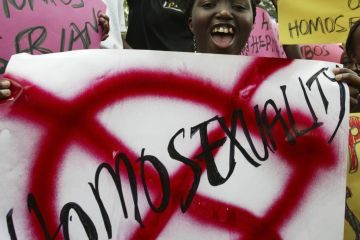Uganda’s President Yoweri Museveni must veto the Anti-Homosexuality Bill, which was passed in a surprise vote on Friday morning. The passage of the Bill – which dramatically increases the criminal penalties for consensual sexual activity between adults of the same sex – amounts to a grave assault on human rights.
In addition to violating rights to privacy, family life and equality, the bill threatens freedom of association and expression – all protected under Ugandan and international human rights law. It institutionalises discrimination against already marginalised lesbian, gay, bisexual, transgender and intersex (LGBTI) individuals in the country.
“President Museveni must veto this wildly discriminatory legislation, which amounts to a grave assault on human rights and makes a mockery of the Ugandan constitution,” said Aster van Kregten, Deputy Africa Director at Amnesty International.
“Passing the Anti-Homosexuality Bill was a retrograde step for Uganda’s Parliament, which has made some important progress on human rights in recent years, including criminalsing torture. It flies in the face of the Ugandan government's stated commitment to ensure all legislation complies with human rights.”
On 10 September this year the government’s Speaker of Parliament launched a human rights checklist to give lawmakers criteria to assess whether new pieces of legislation were at risk of violating key rights and freedoms protected by Uganda's Constitution, including freedom of expression and freedom from discrimination. The passage of the Anti-Homosexuality Bill only three months later suggests Ugandan parliamentarians have completely disregarded this commitment.
According to Ugandan NGOs, an opposition Member of Parliament tabled the bill this morning without prior notice. Despite objections from the floor, the bill was swiftly adopted after its second and third readings both took place today, and now only requires presidential assent within 30 days for it to take effect.
The Anti-Homosexuality Bill was first introduced in 2009 and reintroduced to Parliament in 2012. Amnesty International and other Ugandan and international human rights organisations have repeatedly called for the legislation to be scrapped.
A provision in the earlier draft of the bill imposing the death penalty for “aggravated” homosexuality has been replaced with a life sentence. Among those who could be charged with “aggravated homosexuality” are so-called “serial offenders,” and anyone who is HIV-positive and found to have had sexual relations with a person of the same sex – even when such conduct is consensual and protected.
"This bill will institutionalise discrimination, hatred and prejudice in law against lesbian, gay, bisexual transgender and intersex Ugandans, who are already marginalised,” said Aster van Kregten.
Other disturbing provisions of the draft bill included criminalising the “promotion” of homosexuality, compelling HIV testing in some circumstances, and imposing life sentences for entering into a same-sex marriage.
The bill would significantly hamper the work of human rights defenders and others who find themselves in conflict with the law merely by carrying out their legitimate activities.
“The knock-on effect of passing this bill will reach far beyond gay and lesbian people in Uganda, impeding the legitimate work of civil society, public health professionals, and community leaders,” said Aster van Kregten.
“President Museveni must demonstrate the Government’s stated commitment to human rights compliant legislation by refusing to assent to this Bill.”
Background
Under existing Ugandan law, anyone found guilty of “carnal knowledge against the order of nature” – a reference to same-sex sexual conduct – can already face up to life imprisonment. This already violates international norms, but the Anti-Homosexuality Bill goes far above and beyond this legislation.
Uganda’s constitution, particularly article 29, contains strong protections for freedom of expression, conscience and belief.
The United Nations Human Rights Committee ruled in November 2012, in a case concerning Russia, that prohibitions against the “propaganda of homosexuality” are in violation of non-discrimination protections guaranteed by the International Covenant on Civil and Political Rights. The Human Rights Committee ruled in 1994 that laws criminalizing consensual same-sex sexual activity were in violation of the right to privacy.
